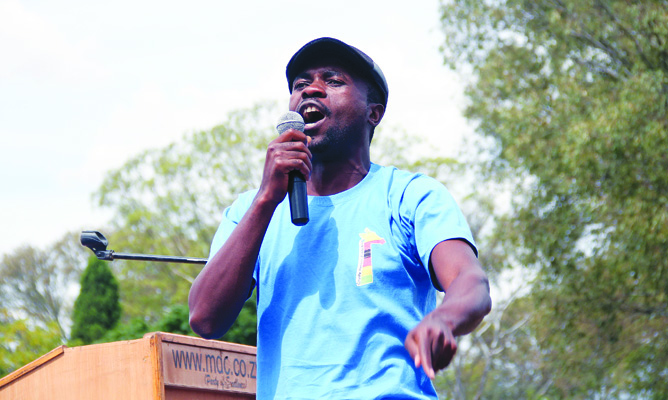
THE Zimbabwe Human Rights Commission (ZHRC) this week issued two far-reaching statements on issues that have thrust the country onto the international map for the wrong reasons.
ZHRC, one of the commissions created following the enactment of the new Constitution in 2013, finally rose to the occasion after adding its voice to the increasing calls for government to show more seriousness in the search for missing human rights activist Itai Dzamara.
The commission also warned the government against using the military to remove vendors from the streets after last month’s ultimatum by the Joint Operations Committee — a grouping of army, police and intelligence commanders.
Dzamara disappeared on March 9 after he was seized by unknown men, days after he addressed an MDC-T rally in Harare. The European Union, United States, Canada and other bodies have been calling on the government to find him and for the alleged abduction to be investigated.
ZHRC chairperson Elasto Mugwadi told a parliamentary committee on Wednesday that he had received thousands of petitions from the international community protesting against Dzamara’s disappearance.
Mugwadi’s statements were unexpected coming from the head of a government-appointed body, but these are the issues that the commission should be seized with all the time.
The ZHRC boss proved that the Dzamara statement was not just made to please certain quarters when he waded into the controversial issue of vendors in an interview with NewsDay on the same day.
A June 26 deadline for illegal vendors to leave the streets across the country was largely ignored and government’s next step has largely been a subject of speculation.
- Chamisa under fire over US$120K donation
- Mavhunga puts DeMbare into Chibuku quarterfinals
- Pension funds bet on Cabora Bassa oilfields
- Councils defy govt fire tender directive
Keep Reading
There is still tension between the vendors and authorities with some traders being of the firm belief that the security apparatus could still be unleashed on them.
Therefore, ZHRC’s warning to government “against another (Operation) Murambatsvina”is spot on.
Such statements would be reassuring to many who fear commissions set up under the new dispensation would be toothless because of Zanu PF’s intolerance.
Mugwadi pointed out that the removal of vendors should not be on the same basis as Operation Murambatsvina, which destroyed the livelihoods of over 700 000 people.
He rightly pointed out that a forced removal of the vendors would be a violation of their socio-economic rights and it would disrupt their livelihoods.
According to organisations representing vendors, up to 250 000 people would be affected if the government goes ahead to remove the vendors without providing alternative trading sites.
The setting up of ZHRC was meant to curb the wanton violation of rights dating back to the days of Gukuruhundi massacres soon after independence.
If the commission continues to speak truth to power, authorities would know that impunity has consequences and those who transgress are called to order.
ZHRC does not have powers to prosecute human rights violators, but its voice is very important to curb government excesses.
When such condemnation comes from a government body, Zanu PF and the government would not get away with lynching the messenger as a puppet of the West as it often does with its opponents.
Human rights are largely misunderstood by the government and ZHRC would have to be more visible and vocal to cultivate a culture of respects for citizens’ rights.











